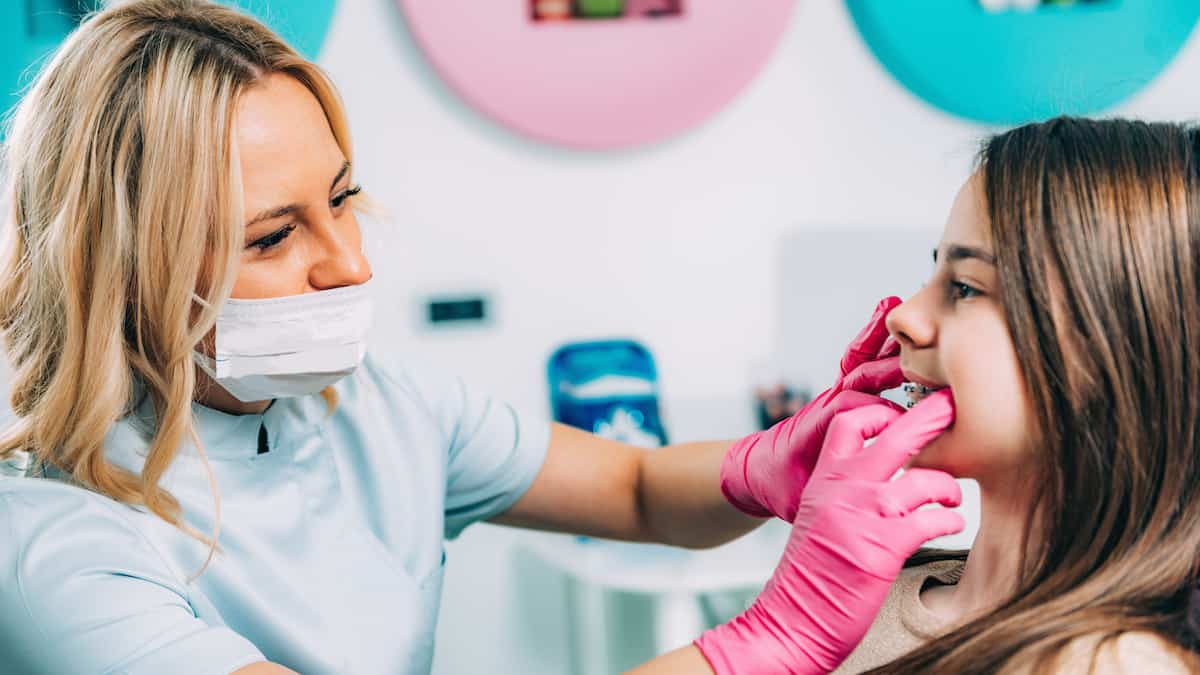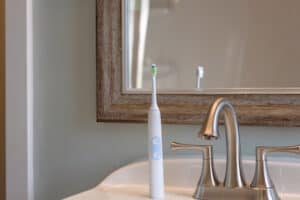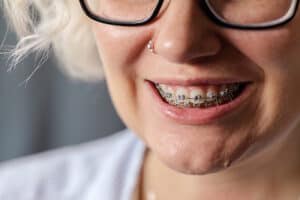
15 Jul Is It Safe to Use an Electric Toothbrush with Braces?
Is Using An Electric Toothbrush with Braces Safe?
Maintaining oral hygiene is crucial, especially when you have braces. Regular brushing and flossing become even more important during orthodontic treatment to ensure the health of your teeth and gums. While manual toothbrushes have long been the standard choice, electric toothbrushes have gained popularity in recent years. But is it safe to use an electric toothbrush with braces? In this article, we will explore the benefits and potential risks of using an electric toothbrush during orthodontic treatment.
Understanding the Importance of Oral Hygiene with Braces
When you have braces, it’s essential to maintain excellent oral hygiene. Braces create tiny spaces where food particles can easily get trapped, leading to plaque buildup, tooth decay, and gum disease. Therefore, thorough and regular brushing is crucial to prevent these issues and keep your teeth and gums healthy throughout your orthodontic journey. And while it may seem difficult to maintain good hygiene when having braces, it can be done efficiently and safely.
Electric Toothbrush With Braces: Safety Concerns
While electric toothbrushes are generally safe to use with braces, it’s essential to consider a few safety concerns:
- Damage to Brackets. Vigorous brushing or using the wrong brushing technique may cause brackets to break or detach. It’s crucial to be gentle and avoid excessive pressure.
- Gum Sensitivity. Some individuals with braces may experience gum sensitivity or tenderness, particularly in the early stages of treatment. Using a softer brush head can help alleviate discomfort.
- Oral Irritation. Electric toothbrushes with high-speed vibrations or rotations may cause oral irritation in some individuals. If you experience any discomfort, consult your orthodontist.
- Proper Technique. It’s important to follow the proper brushing technique recommended by your orthodontist to ensure effective cleaning without causing harm to your braces or oral tissues.

Benefits of Using an Electric Toothbrush
Electric toothbrushes offer several advantages over manual ones, making them a popular choice for many individuals, including those with braces. Here are a few of those benefits:
- Efficiency. Electric toothbrushes feature oscillating or rotating brush heads that can clean teeth more effectively and efficiently than manual brushing.
- Ease of Use. The vibrating or rotating motion of an electric toothbrush helps remove plaque and debris effortlessly, reducing the effort required during brushing.
- Built-in Timers. Many electric toothbrushes come with built-in timers that ensure you brush for the recommended two minutes, promoting thorough cleaning.
- Pressure Sensors. Some advanced electric toothbrushes have pressure sensors that alert you if you’re applying too much pressure, preventing potential damage to your braces or gums.
- Interchangeable Brush Heads. Electric toothbrushes often offer a range of brush heads suitable for different needs, such as sensitive teeth or orthodontic appliances.
Choosing the Right Electric Toothbrush for Braces
When selecting an electric toothbrush for use with braces, consider the following factors:
- Orthodontic-Friendly Features. Look for toothbrush models specifically designed for orthodontic patients. These may have specialized brush heads or features tailored to clean around braces effectively.
- Soft Bristles. Opt for an electric toothbrush with soft bristles to minimize the risk of gum irritation and damage to brackets or wires.
- Rechargeable vs. Battery-Powered. Rechargeable electric toothbrushes often offer more consistent power and superior brushing performance compared to battery-powered options.
- Brand Reputation. Choose a reputable brand known for producing high-quality electric toothbrushes with positive user reviews and reliable customer support.
Proper Techniques for Using an Electric Toothbrush with Braces
To maximize the benefits of using an electric toothbrush with braces, follow these steps:
1. Apply a small amount of fluoride toothpaste to the brush head.
2. Gently place the brush bristles at a 45-degree angle against the gum line.
3. Move the brush head in small circular motions, ensuring the bristles reach all surfaces of the teeth and brackets.
4. Spend at least 30 seconds on each quadrant of your mouth, focusing on the areas around the braces.
5. Pay extra attention to cleaning around wires, brackets, and any other orthodontic appliances.
6. Brush the chewing surfaces and the backs of your teeth as well.
7. Rinse your mouth thoroughly with water after brushing.
8. Clean your electric toothbrush and store it in a clean, dry place.
Additional Oral Hygiene Practices for Braces
While using an electric toothbrush is an effective way to maintain oral hygiene with braces, it’s essential to incorporate additional practices for optimal results. First, regular flossing is critical to remove plaque and food particles from between teeth and around braces. Consider using floss threaders or specialized orthodontic floss to make the process easier. You will also want to use mouthwash. Using an antimicrobial mouthwash can help kill bacteria and freshen your breath. Look for a non-alcoholic mouthwash that won’t cause dry mouth. In addition, using interdental brushes or proxy brushes can reach areas where regular toothbrush bristles can’t, ensuring comprehensive cleaning around brackets, wires, and tight spaces. And finally, if your braces cause irritation or discomfort, applying orthodontic wax over the brackets can provide temporary relief.

Common Misconceptions about Electric Toothbrushes and Braces
Let’s debunk a few common misconceptions surrounding the use of electric toothbrushes with braces:
- Electric Toothbrushes Cause Brackets to Loosen. As long as you use an electric toothbrush with a gentle brushing technique, there is no increased risk of brackets loosening or detaching.
- Manual Toothbrushes are Better. While manual toothbrushes can effectively clean teeth, electric toothbrushes offer additional benefits such as improved efficiency and built-in timers.
- Electric Toothbrushes are Expensive. While some advanced electric toothbrush models may come with a higher price tag, there are affordable options available that still provide excellent cleaning performance.
Things To Avoid When You Have Braces
When you have braces, it’s essential to be mindful of certain things to avoid in order to protect your orthodontic appliances and ensure the success of your treatment. Firstly, it’s important to steer clear of sticky and chewy foods that can get stuck in your braces, such as caramel, chewing gum, and sticky candies. These can damage the brackets and wires, prolonging the treatment process. Additionally, it’s advisable to avoid hard and crunchy foods like popcorn kernels, hard candies, and ice cubes, as they can cause brackets to break or wires to bend. Habits like biting your nails, chewing on pens, or opening packages with your teeth should also be avoided, as they can harm your braces. Lastly, it’s crucial to be cautious during physical activities or contact sports to prevent injuries to your mouth. By avoiding these activities and foods, you can protect your braces and ensure a smooth orthodontic journey.
Conclusion
Using an electric toothbrush with braces can be safe and effective if proper techniques and precautions are followed. These modern devices provide efficient cleaning, built-in timers, and various orthodontic-friendly features. Remember to choose a soft-bristled electric toothbrush, follow the recommended brushing techniques, and incorporate additional oral hygiene practices such as flossing and using mouthwash. By maintaining excellent oral hygiene throughout your orthodontic journey, you can ensure the health of your teeth and achieve a beautiful smile. Thank you for reading our article, please consider sharing it.
Related Questions
Can I use an electric toothbrush immediately after getting braces?
It’s generally safe to use an electric toothbrush after getting braces. However, consult your orthodontist for specific instructions based on your treatment plan.
Are there any age restrictions for using an electric toothbrush with braces?
Electric toothbrushes can be used by individuals of all ages with braces. However, young children may require supervision to ensure proper brushing techniques.
Can I share my electric toothbrush with others, even if they don’t have braces?
It’s not recommended to share electric toothbrushes, regardless of whether someone has braces or not. Sharing brushes can transfer bacteria and compromise oral hygiene.
How often should I replace the brush head of my electric toothbrush?
Most manufacturers recommend replacing the brush head every three to four months or sooner if the bristles become frayed. With braces, you may need to replace them more frequently due to increased wear.



Sorry, the comment form is closed at this time.